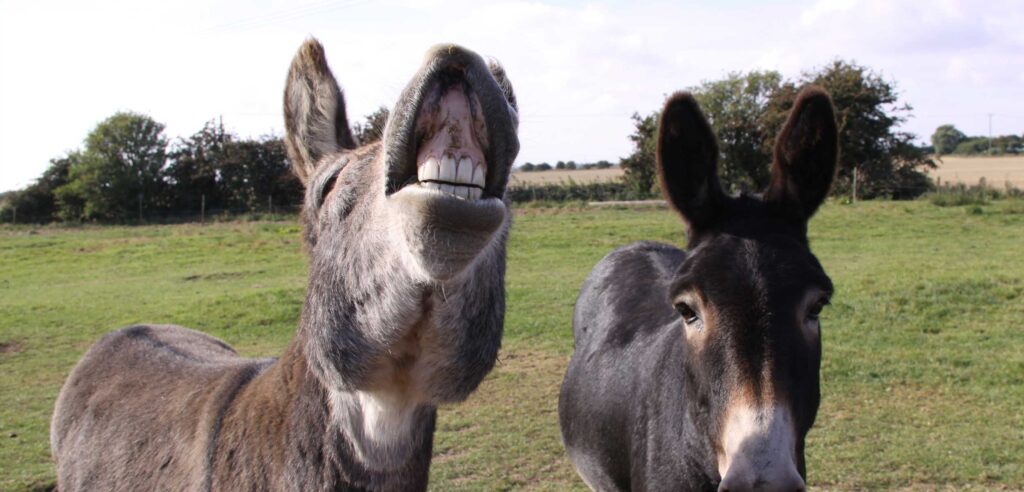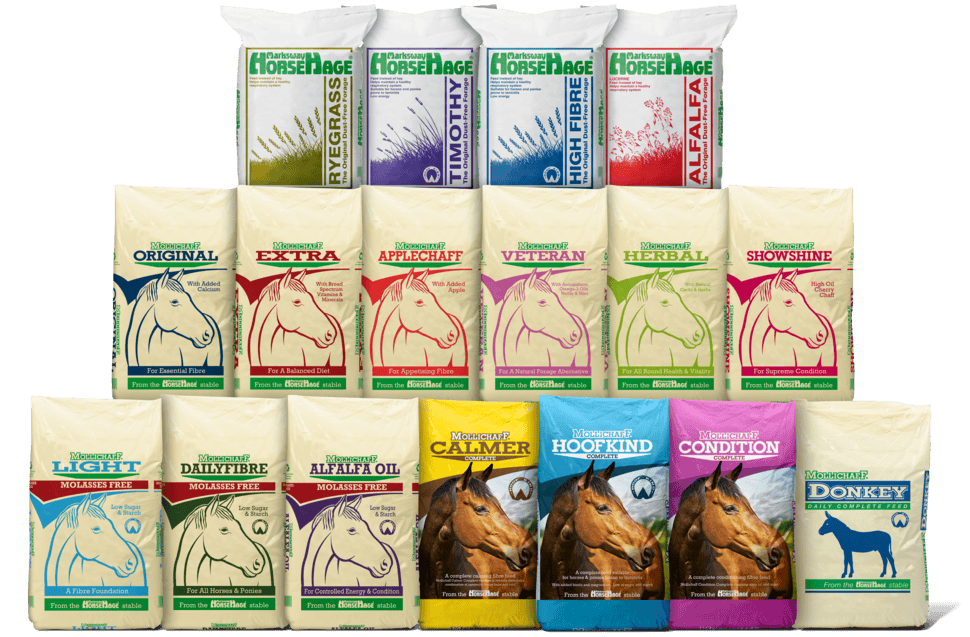
Although mules and donkeys are members of the equine family, their diets differ substantially from horses. Which means that, contrary to popular belief, they cannot be fed the same diet as a horse in a smaller quantity.
Donkeys and mules have distinct evolutionary traits that mean they are anatomically and behaviourally unique.
What Does a Donkey’s Diet Need?
Through thousands of years of living in arid and semi-arid environments with only low nutritional quality food available, donkeys have evolved to metabolise their food very efficiently and can utilise more mature, less digestible, more fibrous foods than horses.
Each donkey’s diet should be designed in relation to their body condition, age, temperament, underlying health conditions and grazing availability. An inappropriate diet can result in boredom, obesity, and other serious health conditions.
Forage
Donkeys and mules require a high fibre diet that is low in protein, sugars, starch, and calories.
Although they are designed to continually digest large quantities of fibre, the smaller parts of the donkey digestive system are not well-adapted to breaking down large singular meals. Donkeys should trickle feed on a fibrous diet that they can have access to throughout the day to maintain hindgut health.
Good quality clean straw should make up the make up the majority of a donkey’s diet. Barley straw or wheat straw are ideal for donkeys due to their high-fibre content and low levels of protein and carbohydrates.
Many donkeys in the UK have access to grass. As straw should be a major percentage of a healthy donkey’s diets, grazing should be considered a supplement to the straw being provided. The amount of grass available, especially during the spring, must be controlled careful to ensure donkeys do not become overweight. Grazing alongside other animals, strip grazing or a track system may help manage the amount grass available although it may be preferential to remove the donkey from grazing completely.
Hay can be suitable for some donkeys as supplement to straw providing that the nutrient levels are appropriate for the individual.
Haylage can also be fed as an alternative to hay although, as with hay, nutritional values can vary making it unsuitable for some. Haylage does have the added benefit of being dust free.
If you are looking to feed hay or haylage on top of the straw being provided you may want to consider having it analysed before feeding. Alternatively, you could look to feed haylage that has already been analysed by the manufacture and preferably deemed as ‘suitable for those prone to laminitis’.
Failing to provide large amounts of appropriate forage to feed on throughout the day can have damaging effects on the mental wellbeing of donkeys. If they’re unable to perform their natural trickle-feeding behaviour, they can become bored and frustrated.
Straw based chaff products can be fed although always opt for those that are low in sugar and starch. Products that are designed specifically for laminitis-prone donkeys are always best. They can be used for donkeys with poor dentition that may struggle to eat the long strands of straw and grass.
Vitamins and Minerals
Forage only diets may need supplementing with additional vitamin and minerals to ensure a donkey’s daily requirements are fulfilled to promote optimum health. Vitamins and minerals can be provided in the form of a balancer, mineral block or complete feed specially formulated for a donkey’s nutritional needs.
Water
Donkeys should always have access to clean water, a secure bucket or self-filling trough should always be available and should be cleaned out each day after the stable has been mucked out so that dust and dirt do not contaminate the water supply.
Just as with horses, it’s important to check water supplies each morning in the winter to ensure they have not frozen over during the night. During the colder months, it can be beneficial to bring out lukewarm water or install a water heating system as donkeys prefer to drink warmer water.
Donkeys can be fussy about their water supply and are likely to be suspicious of newly introduced sources of water, however they will happily drink from it once they begin to trust it.
What Not to Feed a Donkey
Curiosity and boredom are two of the key reasons why donkeys might accidentally eat food, foliage and plant matter that is toxic to them. Prevention is always better than cure so it’s vital that your donkey never has access to any of the following items.
- Donkeys should never be fed mouldy hay as they may have potentially fatal allergies to the mould
- Meat or dairy should never be fed as animal protein can be fatal, the same can be said for cod liver oils or other oils of animal origin
- Cereal/grain-based diets should be limited, as they can cause an increased risk of gastric ulcers compared to fibre concentrates or a forage-only diet
- Chocolate, sugar lumps or sweets
- Brassicas (cabbage, brussels sprouts, broccoli, cauliflower, etc.)
- Any member of the allium family (garlic, onions, leeks, chives, shallots, etc.)
- Potatoes
- Avocados
- Yew
Mollichaff Donkey
Mollichaff Donkey is a low sugar, starch and energy mix that is highly palatable and suitable for donkeys prone to laminitis.
Containing a balanced blend of dried grass, fibre pellets, oat straw and soya oil with camomile, mint and lemon balm, Mollichaff Donkey can be used as a total forage replacer. Alternatively, if fed at the recommended levels, it needs no other supplementation other than good quality forage.
If you’d like to get in touch with expert our team to discuss the suitability of Mollichaff Donkey for your donkey, you can call our dedicated helpline on: 01803 527274.


